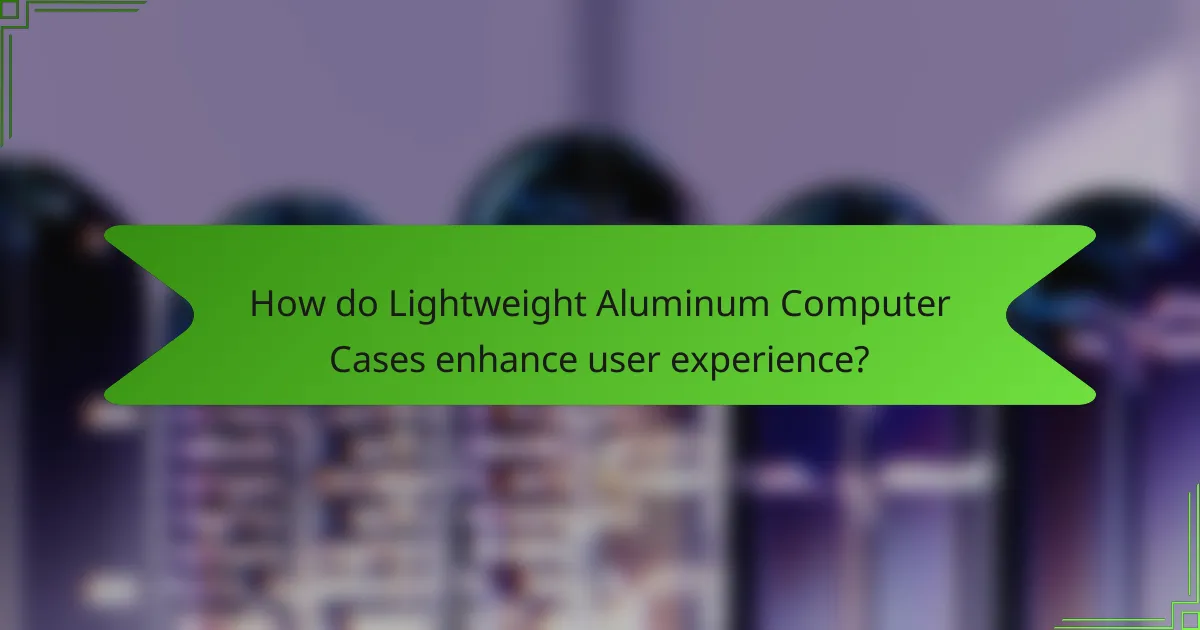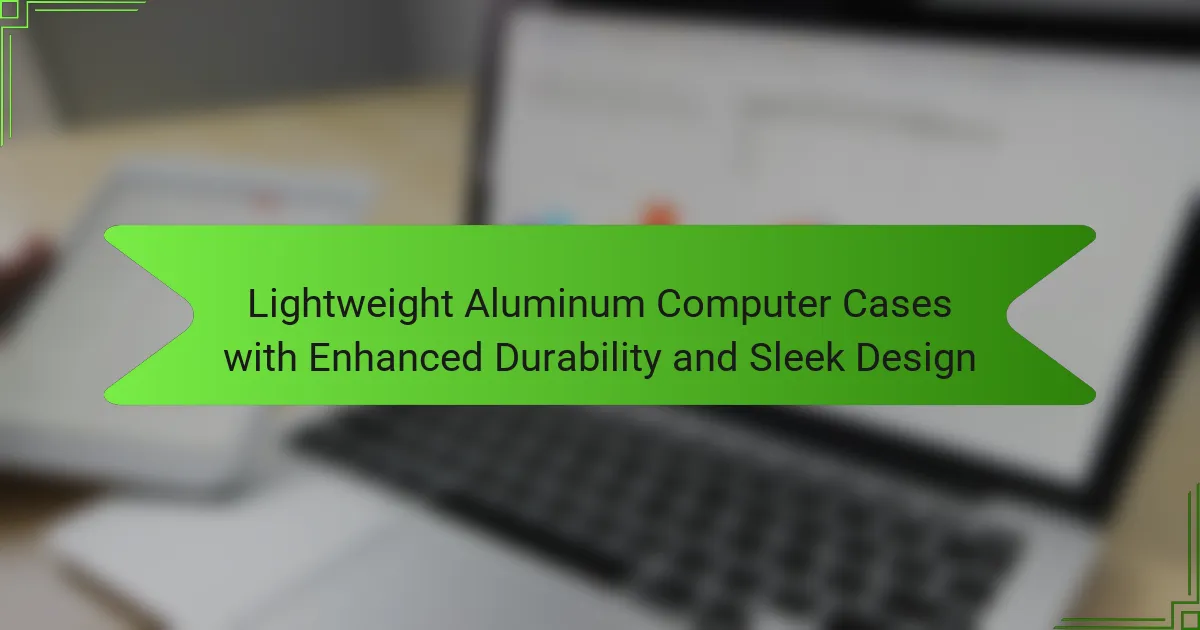
What are Lightweight Aluminum Computer Cases?
Lightweight aluminum computer cases are enclosures made primarily from aluminum that house computer components. These cases are designed to be lighter than traditional steel cases. Their lightweight nature contributes to easier transport and installation. Aluminum also offers natural resistance to corrosion and improves durability. Many lightweight aluminum cases feature a sleek design, appealing to aesthetic preferences. They can provide better thermal management due to aluminum’s heat conductivity. This type of case is popular among gamers and professionals seeking portability and style. The combination of lightweight, durability, and design makes them a favored choice in the tech community.
How do lightweight aluminum computer cases differ from traditional cases?
Lightweight aluminum computer cases differ from traditional cases primarily in their material composition. Aluminum is significantly lighter than steel or plastic, which are commonly used in traditional cases. This weight reduction makes aluminum cases easier to transport and handle.
Additionally, aluminum offers better thermal conductivity, promoting efficient heat dissipation. Traditional cases may not provide the same level of airflow and cooling efficiency. Furthermore, aluminum cases tend to have a more modern and sleek aesthetic.
Their design often incorporates minimalist features, enhancing visual appeal. Traditional cases may appear bulkier and less refined. Overall, the differences stem from material properties, thermal performance, and design aesthetics.
What materials are commonly used in lightweight aluminum computer cases?
Lightweight aluminum computer cases commonly utilize aluminum alloy, plastic components, and tempered glass. Aluminum alloy provides strength while maintaining a low weight, making it ideal for portability. Plastic components are often used for internal structures and connectors, reducing overall weight further. Tempered glass panels are frequently included for aesthetic appeal and visibility of internal components. These materials combine to create a durable yet lightweight design suitable for modern computing needs.
What are the weight advantages of aluminum over other materials?
Aluminum is significantly lighter than many other materials, such as steel and plastic. This weight advantage is due to aluminum’s low density, which is approximately 2.7 g/cm³. In contrast, steel has a density of about 7.85 g/cm³. This means aluminum can provide similar structural strength while being much lighter. For example, using aluminum in computer cases can reduce overall weight by up to 50% compared to steel cases. This reduction in weight enhances portability and ease of handling. Additionally, aluminum’s lightweight nature does not compromise its durability, making it an ideal choice for modern computer cases.
What features define enhanced durability in aluminum computer cases?
Enhanced durability in aluminum computer cases is defined by several key features. These features include high-grade aluminum alloy construction, which provides strength and resistance to bending. Anodized finishes enhance corrosion resistance, preventing wear over time. Reinforced corners and edges add structural integrity, reducing the risk of damage from impacts. Additionally, internal bracing can improve the overall rigidity of the case. Ventilation designs that minimize dust accumulation also contribute to longevity by preventing overheating. Finally, the use of high-quality fasteners and hinges ensures that components remain secure and functional throughout the case’s lifespan.
How does aluminum contribute to the durability of computer cases?
Aluminum contributes to the durability of computer cases through its strength and resistance to corrosion. This metal has a high strength-to-weight ratio, making it robust yet lightweight. Its natural oxide layer protects against environmental damage. Aluminum can withstand impacts better than many plastics. It also dissipates heat effectively, preventing overheating. These properties enhance the overall lifespan of computer cases. Research shows that aluminum cases can last significantly longer than those made from other materials. This durability is critical for protecting sensitive electronic components inside.
What testing standards are used to assess the durability of these cases?
Testing standards for assessing the durability of lightweight aluminum computer cases include MIL-STD-810 and IEC 60529. MIL-STD-810 evaluates the environmental conditions these cases can withstand. It covers factors such as temperature extremes, humidity, and shock resistance. IEC 60529 assesses ingress protection against dust and water. These standards ensure that the cases meet specific durability requirements. Compliance with these standards signifies that the cases are reliable for various usage scenarios. Testing under these standards provides manufacturers with a benchmark for quality assurance.
What design elements contribute to the sleek appearance of aluminum computer cases?
Aluminum computer cases achieve a sleek appearance through several design elements. First, the use of brushed or anodized finishes creates a smooth surface. These finishes reflect light subtly, enhancing visual appeal. Second, the minimalist design often features clean lines and a streamlined silhouette. This simplicity avoids visual clutter and emphasizes elegance. Third, the integration of hidden screws and seamless joints contributes to a polished look. This design choice minimizes visible hardware, maintaining a cohesive appearance. Additionally, the lightweight nature of aluminum allows for thinner walls without compromising durability. This results in a refined profile that is both modern and functional. Together, these elements establish the sleek aesthetic that aluminum computer cases are known for.
How does the finish of aluminum affect its aesthetic appeal?
The finish of aluminum significantly influences its aesthetic appeal. Different finishes can enhance the visual characteristics of aluminum. For example, a polished finish creates a shiny, reflective surface that adds elegance. Conversely, a matte finish offers a more subdued and modern look. Anodized finishes provide color options and increased durability while maintaining a sleek appearance. Textured finishes can add depth and interest to the surface. The choice of finish can impact consumer perception and preference. In the market for lightweight aluminum computer cases, aesthetic appeal is crucial for attracting buyers. Ultimately, the finish of aluminum plays a vital role in defining its overall look and feel.
What role does form factor play in the sleek design of computer cases?
Form factor significantly influences the sleek design of computer cases. It determines the dimensions and layout of components within the case. A compact form factor allows for a streamlined appearance. This design minimizes bulk and enhances aesthetic appeal. Additionally, certain form factors promote efficient airflow. Improved airflow contributes to better cooling and performance. Sleek designs often incorporate minimalist features, which are easier to achieve with specific form factors. For example, MicroATX and Mini-ITX cases are popular for their space-saving qualities. These factors collectively enhance the overall user experience and visual impact of computer cases.

How do Lightweight Aluminum Computer Cases enhance user experience?
Lightweight aluminum computer cases enhance user experience by providing superior portability and thermal management. Their lightweight nature allows users to easily transport their computers without added strain. Aluminum’s excellent heat dissipation properties help maintain optimal operating temperatures. This reduces the risk of overheating during intensive tasks. Additionally, the sleek design of aluminum cases offers a modern aesthetic. Users appreciate the visual appeal that complements their workspace. The durability of aluminum also ensures long-lasting protection for internal components. This reliability fosters confidence in the performance of the computer. Overall, these factors contribute to a more satisfying and efficient computing experience.
What benefits do users gain from using lightweight aluminum computer cases?
Users gain several benefits from using lightweight aluminum computer cases. These cases are significantly lighter than traditional steel cases. This reduction in weight enhances portability for users who frequently move their computers. Lightweight aluminum also offers superior thermal conductivity. This helps in better heat dissipation, keeping components cooler during operation. Additionally, aluminum is resistant to corrosion, which increases the longevity of the case. The sleek design of aluminum cases often provides an aesthetic appeal. Many users appreciate the modern look that complements their workspace. Furthermore, aluminum cases can be easier to work with during assembly. Their lightweight nature simplifies the installation of components. Overall, these factors contribute to a more efficient and visually pleasing computing experience.
How does portability impact the choice of computer cases?
Portability significantly influences the choice of computer cases. Lightweight materials, such as aluminum, are preferred for easy transport. Compact designs allow for convenient mobility without compromising functionality. Users often seek cases that fit into backpacks or carry-on luggage. Enhanced durability ensures that cases withstand travel-related wear and tear. Sleek designs appeal to those prioritizing aesthetics alongside practicality. The demand for portable cases has increased with the rise of remote work and gaming on the go. Thus, portability drives the selection of features in modern computer cases.
What ergonomic features are commonly found in sleek aluminum designs?
Sleek aluminum designs commonly feature lightweight construction and a smooth surface finish. These designs often incorporate rounded edges for comfort during handling. Additionally, many aluminum cases include ventilation systems to prevent overheating. Ergonomic grips or handles are frequently integrated for easier transport. Adjustable components, like feet or stands, enhance user interaction. Some designs may offer customizable layouts for improved accessibility. These features collectively promote user comfort and efficiency.
How do lightweight aluminum cases compare to other types of computer cases?
Lightweight aluminum cases are generally more durable and lighter than other types of computer cases. They provide excellent heat dissipation due to aluminum’s thermal conductivity. This feature helps maintain optimal internal temperatures for components. Compared to steel cases, aluminum cases are significantly lighter, making them easier to transport. Additionally, aluminum cases often have a more modern and sleek design. They can be more expensive than plastic or steel cases. However, the longevity and aesthetic appeal often justify the higher cost. Overall, lightweight aluminum cases offer a balance of durability, weight, and design that many users prefer.
What are the pros and cons of aluminum versus plastic cases?
Aluminum cases offer durability and a premium feel, while plastic cases provide lightweight and cost-effective options. Aluminum is resistant to dents and scratches, enhancing longevity. Plastic cases are generally less expensive and can be molded into various shapes. However, aluminum can be heavier than plastic, impacting portability. Plastic cases may not dissipate heat as effectively as aluminum, potentially leading to overheating. In terms of aesthetics, aluminum often presents a more modern look compared to plastic. Each material has its unique advantages and disadvantages, making the choice dependent on user preferences and specific needs.
How does cost compare between lightweight aluminum and other materials?
Lightweight aluminum generally costs more than materials like steel and plastic. Aluminum’s price per pound is typically higher, ranging from $1.00 to $2.00, while steel costs about $0.50 to $1.00 per pound. However, aluminum’s lightweight nature can lead to savings in shipping and handling costs. Additionally, aluminum offers better corrosion resistance, potentially reducing long-term maintenance expenses. The initial investment in aluminum can be offset by its durability and longevity compared to cheaper materials.

What should consumers consider when choosing a Lightweight Aluminum Computer Case?
Consumers should consider weight, durability, cooling efficiency, and design aesthetics when choosing a lightweight aluminum computer case. Lightweight aluminum provides portability without sacrificing strength. Durability is essential; aluminum cases resist dents and corrosion. Cooling efficiency impacts performance; look for cases with good airflow and fan compatibility. Design aesthetics should match personal style and workspace. Additionally, check for compatibility with components like motherboards and GPUs. Lastly, consider price versus features to ensure value for investment.
What key attributes should be evaluated in lightweight aluminum cases?
Key attributes to evaluate in lightweight aluminum cases include weight, durability, thermal conductivity, and design aesthetics. Weight influences portability and ease of handling. Durability ensures protection for internal components, typically measured by resistance to impact and corrosion. Thermal conductivity affects heat dissipation, crucial for maintaining optimal performance. Design aesthetics encompass visual appeal and ergonomic functionality. Each of these attributes contributes to the overall effectiveness and user experience of the aluminum case.
How important is airflow design in aluminum computer cases?
Airflow design is crucial in aluminum computer cases. Proper airflow ensures optimal cooling for components. Efficient cooling prevents overheating and extends the lifespan of hardware. Aluminum cases often have better thermal conductivity than other materials. This enhances the effectiveness of airflow systems. A well-designed airflow path can lower internal temperatures significantly. Studies show that improved airflow can reduce temperatures by up to 20%. Thus, effective airflow design directly impacts performance and reliability in aluminum computer cases.
What features ensure compatibility with various hardware components?
Lightweight aluminum computer cases ensure compatibility with various hardware components through standardized dimensions and mounting points. These cases typically adhere to ATX, Micro-ATX, or Mini-ITX form factors. This adherence allows for easy installation of motherboards, power supplies, and graphics cards. Additionally, cases often include adjustable drive bays for hard drives and SSDs. The use of universal I/O shield cutouts supports a wide range of motherboards. Ventilation designs accommodate different cooling solutions, including air and liquid cooling. Compatibility with standard PSU sizes ensures power supply integration. Finally, modular designs allow for customization based on specific hardware configurations.
What are some best practices for maintaining aluminum computer cases?
To maintain aluminum computer cases, regularly clean the surface with a soft, damp cloth. This prevents dust and debris buildup. Use mild soap if necessary, but avoid abrasive cleaners. Ensure the case is kept in a cool, dry environment to prevent corrosion. Check for loose screws or components periodically to maintain structural integrity. Avoid placing heavy objects on top of the case to prevent dents. Additionally, consider using anti-static mats when working inside the case to protect components. Following these practices helps prolong the lifespan and appearance of aluminum cases.
How can users effectively clean and care for their aluminum cases?
Users can effectively clean and care for their aluminum cases by following specific steps. First, they should use a soft, lint-free cloth for cleaning. This prevents scratches on the aluminum surface. Second, a mixture of mild soap and water can be used to wipe down the case. This solution effectively removes dirt and grime without damaging the finish. Third, users should avoid abrasive cleaners or scrubbers. These can cause permanent damage to the aluminum. Additionally, drying the case thoroughly after cleaning is essential. This helps prevent water spots and corrosion. Regular maintenance, such as dusting with a microfiber cloth, keeps the case looking new. Following these steps ensures the longevity and aesthetic appeal of aluminum cases.
What common issues should users be aware of to ensure longevity?
Users should be aware of potential issues such as thermal management, physical damage, and corrosion. Thermal management is crucial as overheating can damage internal components. Users should ensure adequate airflow and consider additional cooling solutions. Physical damage can occur from impacts or drops, which may compromise structural integrity. Users should handle cases carefully and consider using protective padding during transport. Corrosion is a concern, especially in humid environments. Users should maintain dry conditions and clean surfaces regularly. Regular inspections for wear and tear can help identify issues early. Addressing these common problems can significantly enhance the longevity of lightweight aluminum computer cases.
Lightweight aluminum computer cases are enclosures primarily made from aluminum, known for their reduced weight compared to traditional steel cases. These cases enhance portability, offer superior thermal management, and feature sleek designs that appeal to users. Key attributes include durability, corrosion resistance, and modern aesthetics, making them popular among gamers and professionals. The article will explore the differences between aluminum and traditional cases, material composition, design elements, user benefits, and maintenance practices to ensure longevity.




